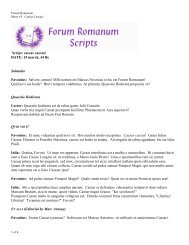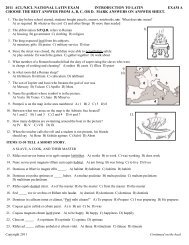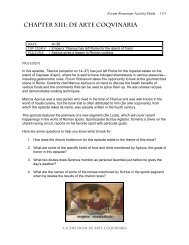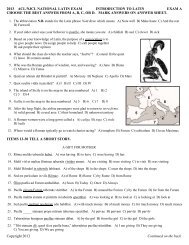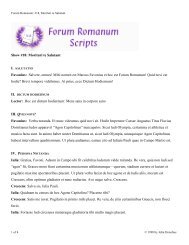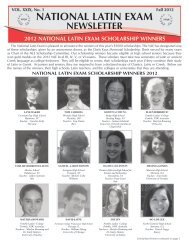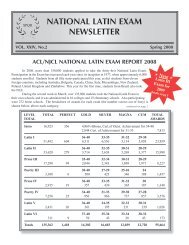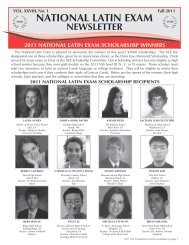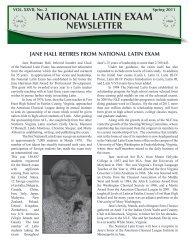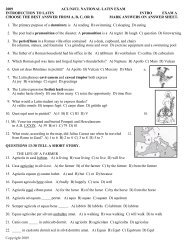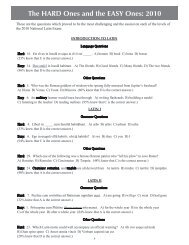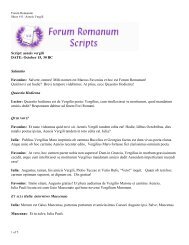2001 ACL/NJCL NATIONAL LATIN EXAM - The National Latin Exam
2001 ACL/NJCL NATIONAL LATIN EXAM - The National Latin Exam
2001 ACL/NJCL NATIONAL LATIN EXAM - The National Latin Exam
You also want an ePaper? Increase the reach of your titles
YUMPU automatically turns print PDFs into web optimized ePapers that Google loves.
WILL IT BE WAR OR PEACE?<br />
In the year 48 B.C., during the civil war between Caesar and Pompey, Caesar decides to send an envoy to Pompey.<br />
To act as this envoy, he chooses Vibullius, one of Pompey’s officers, whom he now holds prisoner<br />
Demonstravimus L. Vibullium Rufum, Pompei praefectum, bis in 1<br />
potestatem pervenissese Caesaris atque ab eo esse dimissum, semel ad 2<br />
Corfinium, iterum in Hispania. Hunc pro suis beneficiis Caesar 3<br />
idoneum iudicaverat quem cum mandatis ad Cn. Pompeium mitteret, 4<br />
eundemque apud Cn. Pompeium auctoritatem habere intellegebat. Erat 5<br />
autem haec summa mandatorum: debere utrumque pertinaciae finem 6<br />
facere et ab armis discedere neque amplius fortiinam periclitari; satis 7<br />
esse magna utrimque incommoda accepta, quae pro disciplina et 8<br />
praeceptis habere possent, ut reliquos casus timerent. 9<br />
Proinde sibi ac rei publicae parcerent, cum, quantum in bello 10<br />
fortuna nosset, iam ipsi incommodis suis satis essent documento 10-11<br />
C. Iulius Caesar, Bellum Civile, III, 10<br />
prii = in return for<br />
idoneum = suitable<br />
periclitari = to test, to risk<br />
utrimque = on both sides; pro disciplina = for learning<br />
Proinde = So then;<br />
quantum...posset: this clause follows documento (line 11)<br />
ipsi = i.e., Caesar and Pompey;<br />
satis essent documento = were proof enough<br />
21. In lines l-3, Caesar informs the reader that Vibullius had A) left Corfinium for Spain B) defected to Caesar’s side<br />
C) been captured and released twice before D) been dismissed by Pompey<br />
22. Ab eo (line 2) means A) to him B) to that place C) away from it D) by him<br />
23. <strong>The</strong> words semel...iterum (lines 2-3) mean A) not only...but also B) once...again C) although...nevertheless D) just...so<br />
24. Hunc (line 3) refers to A) Vibullium B) Pompei C) Caesaris D) Corfinium<br />
25. Why does Caesar judge Vibullius to be a suitable envoy (lines l-4)? A) Vibullius comes from a noble family<br />
B) Vibullius owes Caesar for sparing his life in the past C) Caesar knows Vibullius will want the reward he is offering<br />
D) Vibullius has served as a magistrate in the past<br />
26. <strong>The</strong> words quem...mitteret (line 4) show A) purpose B) doubt C) fear D) disbelief<br />
27. To whom does eundem (line 5) refer? A) the Romans B) Caesar C) the senate D) Vibullius<br />
28. What is the general meaning of apud Cn. Pompeium auctoritatem habere (line 5) ? A) Pompey is the author of several books<br />
B) he was at Pompey’s house C) he has influence with Pompey D) Pompey originated the plan of attack<br />
29. In line 6, mandatorum refers to the A) content of the message that Caesar sends to Pompey B) hostages to be exchanged<br />
C) speech that Caesar gives to his troops D) site of the battle to be fought<br />
30. <strong>The</strong> words erat autem haec summa mandatorum (lines 5-6) introduce a series of A) purpose clauses B) indirect statements<br />
C) conditional sentences D) participial phrases<br />
31 In the lines following summa mandatorum (6- 1 l), Caesar presents A) threats of punishment to Vibullius<br />
B) a strategy for cutting off and destroying Pompey’s army C) conditions for peace between Pompey and himself<br />
D) directions to help Vibullius find Pompey’s camp<br />
32. <strong>The</strong> <strong>Latin</strong> noun pertinaciae (line 6) is related to the English noun “pertinacity” which means A) uniqueness B) obstinacy C) proximity<br />
D) perplexity<br />
33. With the words (debere) neque amplius fortunam periclitari (lines 6-7), Caesar says that A) victory is sometimes won without risk<br />
B) good luck also requires taking a risk C) fortune can sometimes make weapons useless D) neither side ought to take further risks<br />
34. In line 7, ab armis discedere is closest in meaning to A) repair their weapons B) wage war C) cease hostilities D) negotiate a treaty<br />
35. In lines 8-9, the words quae pro disciplina et praeceptis habere possent indicate that<br />
A) Pompey and Caesar could learn lessons from their past experiences B) troops on both sides could lose their discipline<br />
C) one of them may suffer great losses D) Pompey’s troops must learn to win on their own<br />
36. In the clause ut reliquos casus timerent (line 9) Caesar suggests that A) he fears that his soldiers want to leave<br />
B) both he and Pompey should now fear further disasters C) fear often causes the loss of a battle<br />
D) those lef? behind may be the cause of a renewed battle<br />
37. <strong>The</strong> case and number of casus (line 9) is A) accusative plural B) genitive singular C) nominative singular D) nominative plural<br />
38. In lines 10-l 1, Caesar suggests that he and Pompey are proof enough of A) how small losses can cause great difficulties<br />
B) what a powerful factor sheer luck can be in war C) why Fortune’s lessons are often overlooked<br />
D) why foreign wars are the most costly and disastrous<br />
39. In line 11, incommodis suis is best translated A) of their losses B) without their losses C) their losses D) by their losses<br />
40. What is the general import of the message.? A) “Pompey, you have suffered more losses than I have and you are about to suffer even more.”<br />
B) “You, Pompey, will lose because you don’t understand the real meaning of political power.”<br />
C) “We should stop this war because even more terrible things could happen to either side.”<br />
D) “Let’s make arrangements to finish this war with one final battle.”<br />
Copyright <strong>2001</strong>



